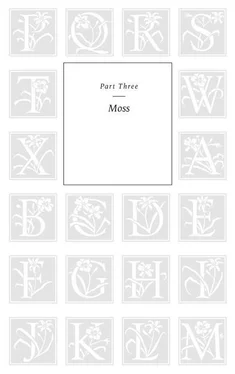Vanessa Diffenbaugh - The Language of Flowers
Здесь есть возможность читать онлайн «Vanessa Diffenbaugh - The Language of Flowers» весь текст электронной книги совершенно бесплатно (целиком полную версию без сокращений). В некоторых случаях можно слушать аудио, скачать через торрент в формате fb2 и присутствует краткое содержание. Жанр: Старинная литература, на английском языке. Описание произведения, (предисловие) а так же отзывы посетителей доступны на портале библиотеки ЛибКат.
- Название:The Language of Flowers
- Автор:
- Жанр:
- Год:неизвестен
- ISBN:нет данных
- Рейтинг книги:4 / 5. Голосов: 1
-
Избранное:Добавить в избранное
- Отзывы:
-
Ваша оценка:
- 80
- 1
- 2
- 3
- 4
- 5
The Language of Flowers: краткое содержание, описание и аннотация
Предлагаем к чтению аннотацию, описание, краткое содержание или предисловие (зависит от того, что написал сам автор книги «The Language of Flowers»). Если вы не нашли необходимую информацию о книге — напишите в комментариях, мы постараемся отыскать её.
The Language of Flowers — читать онлайн бесплатно полную книгу (весь текст) целиком
Ниже представлен текст книги, разбитый по страницам. Система сохранения места последней прочитанной страницы, позволяет с удобством читать онлайн бесплатно книгу «The Language of Flowers», без необходимости каждый раз заново искать на чём Вы остановились. Поставьте закладку, и сможете в любой момент перейти на страницу, на которой закончили чтение.
Интервал:
Закладка:
The days continued this way. Grant left before I awoke in the mornings. I spent long afternoons alone in the greenhouses, passing courteous laborers on my walks between my work and the water tower. Most nights Grant would bring home takeout, but other nights we would eat canned soup and whole loaves of bread or frozen pizzas.
After dinner we read together on the second floor, sometimes even sharing the love seat. On these nights, I would wait for the dizzying need for solitude to overcome me, but just as the air in the room would start to thin, Grant would stand up, bid me good night, and disappear down the spiral staircase. Sometimes he would come back an hour later, sometimes not until the next evening. I didn’t know where he went or where he slept at night, and I didn’t ask.
I had been at Grant’s nearly two weeks when he came home one late afternoon with a chicken. Raw.
“What’re we going to do with this?” I asked, holding up the cold, plastic-wrapped bird.
“Cook it,” he said.
“What do you mean, ‘cook it’?” I asked. “We don’t even know how to clean it.”
Grant held up a long receipt. On the back he’d written instructions, and he read them aloud to me. They started with preheating the oven and ended with something about rosemary and new potatoes.
I turned on the oven. “That’s my contribution,” I said. “You’re on your own from here on out.” I sat down at the table.
He got out a baking sheet and washed the potatoes, then cut them into cubes and sprinkled on rosemary. Putting them on the tray with the chicken, he rubbed the whole thing with olive oil, salt, and spices from a small jar. Washing his hands, he put the tray in the oven.
“I asked the butcher for the easiest recipe possible, and that’s what he came up with. Not bad, right?”
I shrugged.
“The only problem,” he added, “is that it takes over an hour to cook.”
“Over an hour!” The thought of waiting made my head hurt. I hadn’t eaten since breakfast, and my stomach was empty to the point of nausea.
Grant lit a candle and produced a deck of cards. “To distract us,” he said. He set a kitchen timer and sat down across from me.
We played war by candlelight, the only game either of us knew. It kept us just entertained enough to avoid passing out on the table. When the timer buzzed, I set plates on the table and Grant cut the breast of the chicken into thin slices. I pulled a leg off the golden-brown bird and started to eat.
The meal was delicious, the flavor inversely proportional to the amount of effort that had gone into the preparation. The meat was hot and tender. I chewed and swallowed huge mouthfuls, then pulled off the other drumstick before Grant could reach for it, eating the seasoned skin first.
Across from me, Grant ate a slice of breast with his knife and fork, cutting bites one at a time and eating slowly. His face showed both the pleasure of the food and the pride of the accomplishment. He put down his knife and fork, and when he looked across the table, I could see he was enjoying the sight of my ravenous hunger. His watchfulness made me uncomfortable.
I put down my second drumstick, all bones. “You know it won’t, right?” I asked. “Be us?”
Grant looked at me with confusion.
“At the drugstore, the old couple, the slapping and winking; it won’t be us. You won’t know me in sixty years,” I said. “You probably won’t know me in sixty days.”
His smile faded. “Why are you sure?”
I thought about his question. I was sure, and I knew he could tell. But it was hard to explain why I was so sure. “The longest I’ve ever known anyone—unless you count my social worker, which I don’t—is fifteen months.”
“What happened after fifteen months?”
I looked at him, my eyes pleading. When he realized the answer, he looked away, embarrassed.
“But why not now?” It was the exact right question, and when he asked it, I knew the answer.
“I don’t trust myself,” I said. “Whatever you imagine our life would be like together, it won’t happen. I’d ruin it.”
I could see Grant thinking about this, trying to grasp the chasm between the finality in my voice and his vision of our future, and bridging the divide with a combination of hope and lies. I felt something, a combination of pity and embarrassment, for his desperate imaginings.
“Please don’t waste your time,” I said. “Trying. I tried, once, and failed. It’s not possible for me.”
When Grant looked back to me, the expression on his face had changed. His jaw was clenched, his nostrils slightly flared.
“You’re lying,” he said.
“What?” I asked. It was not the response I had expected.
Grant pinched the skin along his hairline with the fingers of one hand, and when he spoke, his words were slow and careful. “Don’t lie. Tell me you’ll never forgive me for what my mother did, or tell me every time you look at me you feel sick. But don’t sit here and lie to me, talking about how it’s your fault we can never be together.”
I picked up the chicken bones, peeling fat away from the tendons. I couldn’t look at him, needed time to process what he was saying. “What my mother did.” There was only one explanation. When I’d first met Grant, I had searched his face for anger, and when I didn’t find it, I claimed forgiveness. But the reality was something else entirely. Grant was not angry with me because even he didn’t know the truth. I didn’t know how it was possible that he’d lived with his mother at the time and still didn’t know, but I didn’t ask.
“I’m not lying.” It was all I could think of to say.
Grant dropped his fork, the metal clattering against the ceramic plate. He stood up. “You’re not the only one whose life she ruined,” he said, then walked out of the kitchen and into the night.
I locked the door behind him.
10 .
July was crowded at the farmers’ market. Strollers heaped with produce and nectarine-smeared toddlers blocked aisles, and elderly men with pushcarts waved impatient arms at distracted mothers. Under my feet, discarded pistachio shells crunched. I skipped to keep up with Elizabeth. She was making her way toward the blackberries.
After lunch, Elizabeth told me, we would make blackberry cobbler and homemade ice cream. It was a bribe to keep me inside the house, away from the record-breaking heat and her quickly ripening grapes, and I had reluctantly agreed. All spring, Elizabeth and I had worked side by side at the vineyard, and I didn’t want to leave the plants alone now that there was little to do but wait. I missed the long mornings suckering the vines, trimming shoots that sprouted from the base of the trunk to keep the strength of the vine focused. I missed carrying a kitchen knife and following behind the small tractor Elizabeth used to disk the rows, pulling the remaining weeds by hand as she had taught me to do: first loosening the roots with the sharp point of the knife, then extracting the plants from the soil. I had been wielding the knife for more than three months before I told Elizabeth that allowing children in foster care to use knives was against the child-welfare code. But she didn’t take it away. You’re not a foster child , she had said simply. And though I no longer felt like a foster child (felt, in fact, so different from the girl who had arrived almost a year before that most mornings I studied my face in the bathroom mirror long after Elizabeth called me to breakfast, looking for physical signs of the change I knew to have occurred), this was not entirely the truth. I was still a foster child, and would be until after my court appearance in August.
Pushing my way through a thick crowd, I reached Elizabeth’s side. “Blackberries?” she asked, passing me a green paper tray. On a red-cloth-covered table the vendor had displayed tall stacks of blackberries, ollalieberries, raspberries, and boysenberries. I plucked one from the tray and put it in my mouth. It was fat and sweet, and stained my fingertips purple where I touched it.
Читать дальшеИнтервал:
Закладка:
Похожие книги на «The Language of Flowers»
Представляем Вашему вниманию похожие книги на «The Language of Flowers» списком для выбора. Мы отобрали схожую по названию и смыслу литературу в надежде предоставить читателям больше вариантов отыскать новые, интересные, ещё непрочитанные произведения.
Обсуждение, отзывы о книге «The Language of Flowers» и просто собственные мнения читателей. Оставьте ваши комментарии, напишите, что Вы думаете о произведении, его смысле или главных героях. Укажите что конкретно понравилось, а что нет, и почему Вы так считаете.












